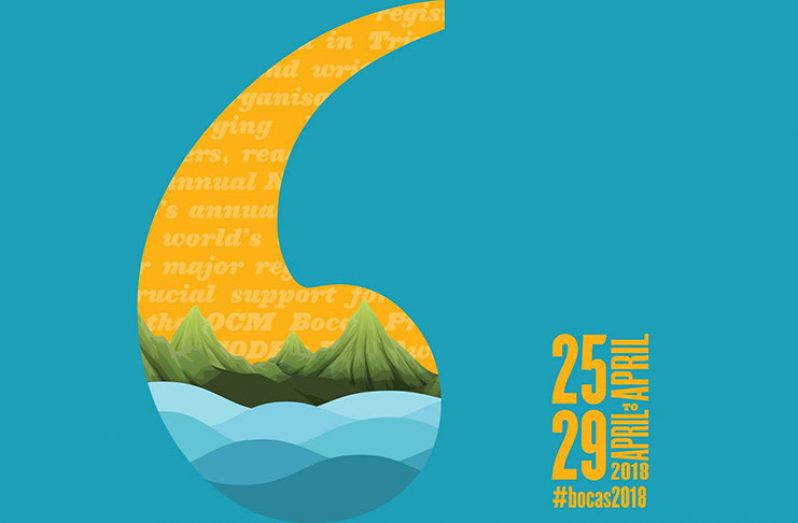OVER the past few years, the NGC Bocas Lit Fest has emerged as one of the most innovative literature festivals, keeping Caribbean literature in all its forms at the forefront of its aims and goals, even as it utilises and reaches out to acknowledge and learn from the spread of literature that shapes the world.
This festival is an important mechanism for the survival of Caribbean literature, and I try my best to talk about it as much as I can; I tell my writer-friends abroad to check it out, and I tell Guyanese writers who have the means to try to attend. I have never been to the Bocas festival, which is perhaps ironic, considering how much I plug it year round. The truth is that I am very happy for writers and people who love writing in Trinidad. They are a part of the Caribbean family and the literary tradition of this part of the world, and any success they may have is a win for regional literature.
I am particularly proud of the fact that Trinidad has emerged from the same colonial history as Guyana to establish itself as one of the countries as a force to be reckoned with when it comes to things literary.
However, Trinidad’s successes also forces me to contemplate the fact that Guyana has failed and is continuing to fail within the artistic sector, especially with regards to giving young people opportunities and the required attention and training that are necessary to foster the arts within our country. It is difficult, at times, to navigate my feelings of happiness for the tiny island of Trinidad that is doing so much for literature, and the feelings of bitterness at my own country that will unable to pull off an iota of what Trinidad has done with the Bocas Lit Fest.
This year the festival will run from April 25th – 29th and as I observe from afar the many events and activities that are beginning to take place in anticipation of Bocas 2018, it is hard to not become disillusioned with the barren artistic landscape that Guyana is slowly becoming. A cursory glance at the Bocas Lit Fest will unfold a series of marvels that are enough to make any reader dizzy and breathless with excitement. For example, this year the featured writers include wonders such as Lorna Goodison (who recently won a well-earned Windham-Campbell Prize for her poetry) and Eleanor Catton (the youngest ever winner of the Man Booker Prize). Those are just two names from the scores of authors who will be attending the festival to host workshops, give readings, or to engage with audience in numerous other ways.
Guyana currently has no plan of action in place to bring in international authors of the same caliber as Goodison and Catton to even give a reading to the local populace, much less more intricate and necessary artistic interaction, such as a workshop or even a simple discussion on the art of writing. It is truly a shame. Shame, indeed, is one of the feelings; linked to the bitterness I feel when I compare the strides Trinidad has taken, far into the literary future, leaving Guyana behind in the dust. This is not to say that there is no representation of Guyana at Bocas.
Last year, three young writers were able to attend, and I note this year that Imam Baksh is there representing Guyana. The problem, I must admit – in fact, we must all admit – lies not merely in the low representation of Guyana at the Bocas Lit Fest, but rather that in our own country, writers are not given the opportunities and training that are necessary for any of them to make a truly regional or international impact on the literary scene.
Guyana itself holds us back from attaining anything close to Bocas – whether it is through the failure to cultivate an appreciation for books and literature, the failure of the government to foster this sense of the honing of local talent by implementing writing programmes at UG and countrywide workshops, or whether it is the general atmosphere of depression, fed by corruption, racial insecurities, human rights violations, and poor education system. Ironically, those are often the same factors that give rise to the best writing in an oppressive society.
Again, I am happy for Trinidad and for everyone there who gets to experience everything it offers, from its MFA in Creative Writing at UWI, to its poetry slams, to its New Play Festival, to, most importantly, the Bocas Lit Fest – which was voted by Penguin Random House as “one of the world’s best literary festivals.” If you are Guyanese, especially if you are a writer, and you can afford it, go to Bocas and cheer as the writers win awards, learn as much as you can from workshops, network with as many people as possible, and remember that those opportunities do not exist back home.
For those who cannot afford it, it is highly improbable that the government will fund you a trip, even if you do deserve it. So, in the meantime, keep working, keep writing, and keep aiming towards that dream of doing so well as a writer that you can fund your own trip to Bocas one year, where you will proudly represent Guyana – the country of your birth that you both love and dislike; the country that rips your soul right down the middle as it sends a hundred aches your way, while also sending a hundred pleasures.




.png)









